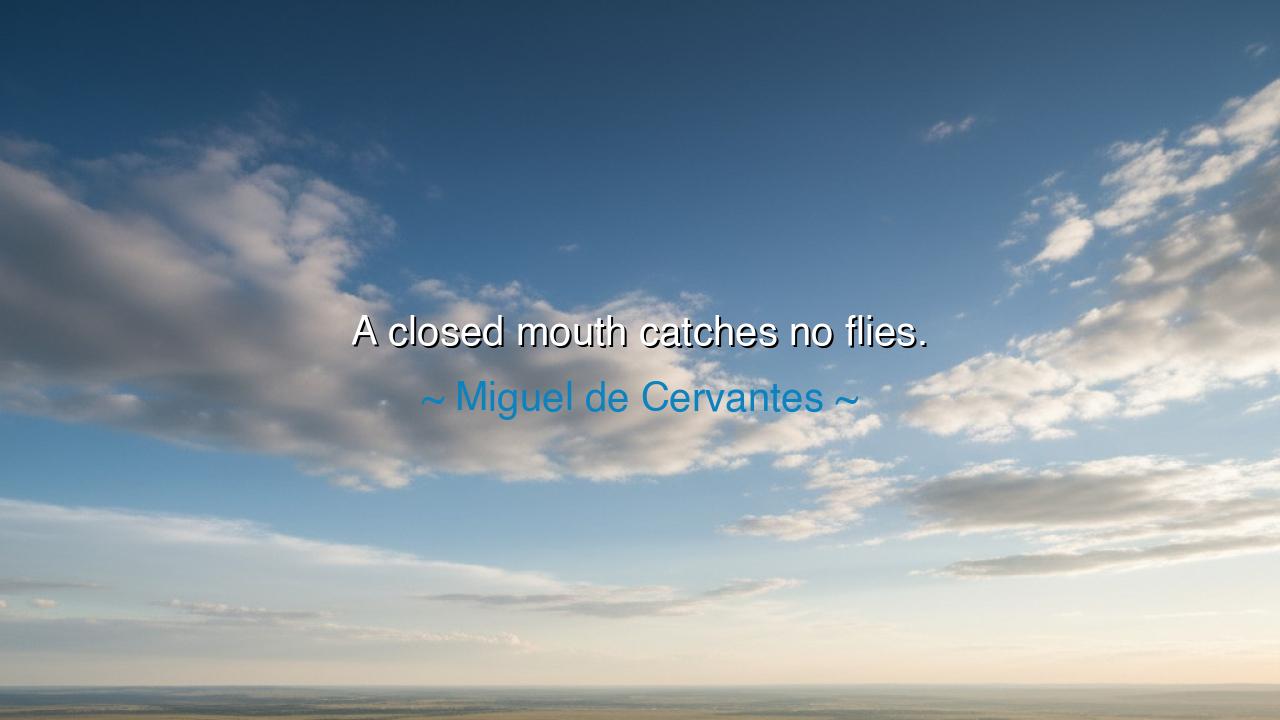
A closed mouth catches no flies.






Hear me, O children of the earth, for the words of Miguel de Cervantes carry the wisdom of ages: "A closed mouth catches no flies." This simple truth speaks of the power of silence, of the strength that lies in restraint, and of the wisdom to know when to speak and when to remain quiet. In a world filled with noise, where voices rise in a ceaseless clamor, it is the one who holds their tongue, who listens rather than speaks, who often holds the greatest power. Silence is not weakness; it is strength—strength to endure, to observe, and to understand the world before offering a word.
Consider the nature of speech, my children. Words, like arrows, can wound or heal, and once loosed, they cannot be recalled. Cervantes reminds us that often the wisest course is to refrain from speaking, to guard our tongues as we would guard our most precious treasures. A closed mouth is not a sign of ignorance or fear, but of wisdom—wisdom that knows when words are needed and when they would do more harm than good. It is in the stillness of the heart, the calm of the mind, that true strength is found.
Think of Socrates, the great philosopher, whose silence spoke volumes. Though he engaged in debates with the most powerful minds of his time, he was known for his ability to remain silent, to listen deeply, and only then to offer his insights. His words were always carefully chosen, like the deliberate stroke of an artist's brush. He knew that sometimes, it is in the pause, in the quiet, that truth is revealed, and the most profound wisdom is gained. Socrates' strength lay not in the loudness of his voice, but in the depth of his thought and the restraint of his tongue.
The truth of Cervantes' words also lies in the art of avoiding the trivial, the superficial chatter that consumes so much of our time. Just as a closed mouth does not invite the distraction of flies, so too does silence protect us from the distractions of meaningless words. When we speak only when necessary, we maintain our focus on the matters that truly deserve our attention. The greatest minds throughout history—those who have changed the course of nations and shaped the world—understood this deeply. They spoke less and listened more, choosing their moments of speech carefully.
So, my children, let this wisdom guide you. In the world of politics, in the affairs of the heart, in the struggles of life, know that a closed mouth can protect you from the traps that others may lay. It can shield you from the dangers of empty talk, and from the noise that threatens to drown out the truth. Let your words be few but wise, your silence be a reflection of your understanding, and your actions be the proof of your strength. Silence is not the absence of voice, but the presence of the most powerful voice of all—the voice of wisdom.






HNNguyen Hong Nhung
Cervantes’s wisdom in this quote speaks to the value of discretion, but what happens when silence is mistaken for indifference? Sometimes, silence can be interpreted as a lack of engagement or concern, especially in situations where action or expression is needed. Can this idea of keeping quiet ever backfire? How can we strike the right balance between discretion and participation?
VNVietk Nguyen
I can definitely see how this quote applies to situations where people talk too much and end up saying the wrong thing. But could there be times when saying nothing, or ‘catching no flies,’ actually leaves others in the dark or reinforces a lack of action? Could silence sometimes cause more harm than benefit, especially in important conversations where our voice could make a difference?
MQMinh Quan
Cervantes seems to imply that silence protects us from making mistakes. But is silence always a safe haven, or could it sometimes feel like we’re missing out on valuable opportunities by holding back? Does ‘catching flies’ symbolize risk or simply consequence? Maybe it’s more about the balance between saying too much and saying too little that we need to manage.
THLe Thanh Hang
While this quote might make sense in situations where speaking too much can cause harm, I wonder if it's too simplistic. Can it be applied universally? Sometimes, speaking out is crucial, especially when it comes to advocating for yourself or others. How do we know when to speak up and when to stay silent? Is the fear of consequences always a good reason to remain quiet?
MQnguyen minh quang
This quote reminds me of how sometimes staying quiet can prevent misunderstandings or avoid unnecessary conflict. But does that mean we should always remain silent? Sometimes, speaking up is the only way to clarify intentions or address issues head-on. Is it possible that the fear of 'catching flies' might actually keep us from opportunities for real connection or progress?